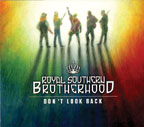 Royal
Southern Brotherhood
Royal
Southern Brotherhood
Don’t Look Back
Rufrecords.DE
The last time out the RSB boasted the talents of guitarists Devon Allman
(son of Gregg) and Mike Zito. Both have moved on to other projects. Now
on board, joining Cyril Neville (vocals, percussion), Yonrico Scott (drums,
percussion) and Charlie Wooton (bass), are newcomers Bart Walker (vocals,
guitar, mandolin, banjo) and Tyrone Vaughan (vocals, guitar). Jimmy Hall
and Max Abrams supply saxophones while Paul Armstrong is on trumpet. The
fellas like to call what they do ‘up the funk.’ It’s
a funky bluesy rocky gumbo fo’ sho’. From the whisper of Anchor
Me to the scream of I Wanna Be Free this bad ass band owns every riff,
every nuance. As one might expect from players with this collective pedigree,
the musical literacy that they bring is impressive. Young Tyrone Vaughan
(Jimmy’s boy) and Bart Walker light up the sky with their firecracker,
speaker-burning, dual-jet guitar work. The title cut features banjo and
percussion in a reggae-inspired rocker. When’s the last time you
heard a banjo on a funky rock recording? Hell, when’s the last time
you heard a funky rock record - with shades of the blues, reggae and Latin
in the pot? This is unique and joyous music. The band covers every groove
that appeals to them. They’re in a rhythmically bluesy frame of
reference on Bayou Baby, with harmonica (uncredited), hard drumming and
searing guitar, but a rip-it-up shred dominates I Wanna Be Free, reminding
at times of Vernon Reid and Living Colour. The interplay between the guitarists
is electrifying. Hit Me Once is a sexy funky number that showcases drumming
as much as Neville’s keyboards. Again, the slinky guitars propel
it deep into an infectious pocket. The Big Greasy is all of that. “There’s
a party everywhere down in the Greasy.” Wah wah guitar talks to
the keys and the conversation is just flat out nasty. Penzi, with acoustic
guitar, congas and vocals has a Spanish feel, almost Santana or Malo-ish.
Beautiful and swaying. Wah wah again drives the groove-heavy They Don’t
Make Em Like You Anymore and the guitars just pounce on Poor Boy. Top
to bottom this is a superb collection from an equally superb collection
of music masters. —Mark E. Gallo
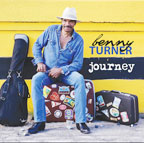 Benny
Turner
Benny
Turner
Journey
NOLA Blue
Benny Turner, the bass and sometimes guitar playing younger brother to
Freddie King, has certainly had a journey. Born in Texas, raised largely
in Chicago and calling New Orleans home for 20 years, he’s seen
much of the world from concert and club stages for more than half a century.
This third outing of all original material, following Blue and Not So
Blue and A Tribute to My Brother Freddie King, is one of the standout
albums of 2015. Strong vocals, first-rate songwriting and a sense of musicality
that drives every impressive song, the journey he takes us on touches
on milestones in his life.
The opener, Breaking News, is a finger-snapper that showcases his vocal
power. With strong vocals like BB, he sings stories that pull us in. The
breaking news is that, “Baby, I’m over you,” and I’m
so over you that, “I must get my hat and my suitcase/ and just have
a barbecue.” This isn’t just over, it’s about puttin’
out the word and getting the BBQ fired up. This is all embellished by
a backing choir that brings just a dab of church into the mix. On How
I Wish Turner sings lead and layers on backing vocals that give it a gospel
group feel, while Mark Stone plays rhythm guitar along with Keiko Komaki
(keys), Jason Mingledorf (sax), Barney Floyd (trumpet), and Jeffery “Jellybean”
Alexander (drums). When he sings, “I sit in this rocking chair/tryin’
to rock these blues away from here/How I wish you were here with me”
you can hear the tear in his voice
There are a couple of standout numbers in this sea of gems. Worn Out Woman
is an ode to the reality that many men fail to notice. Turner sings here
“She’s up in the morning at the break of day/Got to get her
man ready so he can go out and earn some pay/wake the kids up/get ‘em
ready for school/A woman’s work is never done …she’s
a worn out woman/A man works to the setting sun/but a woman’s work
is never done.” This is sung over a repetitive jazzy guitar line
and organ. Also of note is the closer, What’s Wrong With The World
Today. This is a thoughtful and mournful song as befitting the world to
which it is addressed. “It seems to be upset in many ways/people
are dying/because they want to be free/like our fathers did for you and
me/what book is right/is it yours or mine/…can you spare just a
little more change/so many sleeping on the ground/we need love …
hate is a cancer/lay your pistols down boys/love, not kill …”
This is the job of an artist. Not just to entertain, but to enlighten.
Benny Turner does both brilliantly.
Every year there are hundreds of blues CDs released. Some are good. A
few are exceptional. Put this squarely in the latter category. —Mark
E. Gallo
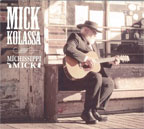 Mick
Kolassa
Mick
Kolassa
Michissippi Mick
Self-produced 2014
This potpourri of a dozen tunes comes to us courtesy of Mick Kolassa,
a Michigan native transplanted to Mississippi (hence the title of the
album), and an adept crew of musical cohorts. Together they tackle a few
covers and eight of Kolassa’s own compositions, running the gamut
from country to acoustic blues, talking blues, a jug band take-off, and
some standard twelve-bar.
Throughout Kolassa plays acoustic guitar, but his instrumental contributions
are secondary to deployment of his vocals; his pleasant tenor accommodates
the occasional falsetto, warble, and rasp to good effect. The songs are
enjoyable and sport some tangy innovations. “The Letter,”
for example, is revamped from the 1967 pop hit by the Box Tops into a
genuine slow blues, undergirded by Chris Stephenson’s organ and
Reba Russell’s backing vocals. “Reefer Man,” a traditional
number, is given a jaunty upbeat lilt, goosed by the piano chops of guest
Victor Wainwright and the electric guitar of band member Jeff Jensen.
Bill Ruffino on bass and Doug McMinn on drums ably round out the band,
abetted by Wainwright on several more tunes and Brandon Santini on harmonica.
This up-and-coming harp player particularly shines on “Blues in
the Night,” a song by jazz eminences Johnny Mercer and Harold Arlen
that additionally benefits from the stylings of guest trumpeter Dedrick
Davis.
There’s quite a bit of humor here to savor, exemplified by “Blowtorch
Love,” “WPD” (“white people dance”; don’t
ask), and “Burned That Bridge”; I fully expect the latter
to be covered by bands like Rick Estrin & the Night Cats, since it
perfectly fits their droll sense of humor.
Deserving kudos go to guitarist Jeff Jensen, who excels throughout, especially
on the languorous lament “Baby’s Got Another Lover”;
Jensen’s sublime leads in that song are reminiscent of those of
Peter Green during the heyday of Fleetwood Mac back in the 1960s when
it was a blues band.
All proceeds from sales of “Michissippi Mick” are to be donated
by Kolassa to charities associated with the Blues Foundation. Thanks for
your largesse, Mick, and for a fine album.— Steve Daniels
 Lazer
Lloyd
Lazer
Lloyd
Lazer Lloyd
Lots Of Love CD lazerlloyd.com
Following hot on the heels of his previous pair of well-received projects—2013’s
bare-bones acoustic solo effort Lost On The Highway and his decidedly
amplified 2012 CD My Own Blues (on Helicon and chosen by the Israeli Blues
Society as album of the year) inspired blues-rocker Lazer Lloyd’s
latest project features recent both acoustic and electric material—with
his deeply expressive writing, plangent vocals and crackerjack guitar
and harmonica work leading the way. Accompanied solely by bassist Moshe
Davidson, drummer Elimelech Grundman and occasional colorful keyboard
work by Kfir Tsairi (check out both the hangover lament “Suffering”
and the reeling and “Rockin’ In The Holy Land” for edification)
Lloyd sings of his experiences constantly traveling between Tel Aviv clubs
and venues in both Russia and North America as well as his faith and the
perils of addiction as his career seems to be taking off. I’m impressed
by many of his tightly composed compositions, such as the life-on-the-road
saga “Broken Dreams,” a heartfelt, soulfully optimistic ballad
called “Never Give Up,” the bluesily atmospheric “Out
Of Time” and the spellbinding tale of a certain “Morrocan
Woman” (“her shakshuka really makes me weep”). The set’s
sole cover is an ardent, stripped-down redo of Otis Redding’s timeless
“(Sittin’ On) The Dock Of The Bay” that’s worth
the price of admission alone. Fasten your seat belts!—Gary von Tersch
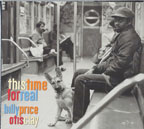 Billy
Price and Otis Clay
Billy
Price and Otis Clay
This Time for Real
Bonedog/VizzTone 2015
Many blues lovers will immediately recognize the name Otis Clay. A mainstay
of soul and R&B since the 1960s, he has garnered multiple awards and
appeared on numerous albums, including last year’s collaboration
with Johnny Rawls, “Soul Brothers,” which earned a Blues Music
Award nomination (one of Clay’s many) as Soul Blues Album of the
Year. But who is Billy Price? Those who aren’t denizens of Pittsburgh
and its surrounding region may fail to recognize this similarly adept
soul singer, based there with his own band, unless they remember his contribution
as vocalist on two of the late, great guitarist Roy Buchanan’s albums
in the 1980s.
Mutual admirers and occasional stage collaborators for decades, Clay and
Price have teamed for this collection of a dozen cover tunes, backed by
formidable guitarist and producer Duke Robillard and Robillard’s
proficient band. Said ensemble includes Mark Earley on saxophones, Doug
Woolverton on trumpet, and a skilled trio of backup singers. The result
is some stirring soul.
Appropriately, Robillard and the band cede prominence to the two principals,
whose singing, together and separately, is superb. Clay’s slightly
raspy and emotive vocals mesh ideally with Price’s smoother offerings;
when they sing in sequence, the contrast is pleasing, and their simultaneous
harmonizing is delicious. The participation of the backup trio lends a
strong gospel vibe.
My only quibble is the uniformity of most of the songs, which are either
medium or slow in tempo share a common structure. One exception is the
uptempo “Broadway Walk,” distinguished by Robillard’s
jaunty six-string accompaniment. Another outlier is “I’ll
Never Do You Wrong,” characterized by lyrics which ride the border
between hilarity and inanity (“If I ever make you sad…I hope
a fever blister comes on my lip”). Also notable is “Love Don’t
Love Nobody,” sporting a beautiful, lyrical, crystalline opening
solo by Earley on sax.
Appreciators of soul music and fine harmonizing will enjoy this album.—
Steve Daniels
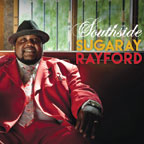 Sugaray
Rayford
Sugaray
Rayford
Southside
NimoySue Records
This third release for the big-voiced sometimes front man of the Mannish
Boys is his second since landing that gig. Like the Mannish Boys it’s
a no-frills affair. Unlike the Mannish Boys the solo work allows a little
more freedom and room to stretch. Caron ‘Sugaray’ Rayford
was Texas born and raised on gospel and soul and there is plenty of each
woven through the blues herein. All of the songs were co-written with
bassist Ralph Carter, except Texas Bluesman, for which he takes sole credit.
The opening title cut has a jazzy backdrop over which Sugaray sings the
praises of that side of town: “If you want to have a good time/make
your way to the south side of town.” Gorgeous electric piano from
Leo Dombecki, slinky guitar lines from Gino Matteo and crisp horns courtesy
of Allan Walker (tenor) and Gary Bivona (trumpet) shape this into a compelling
intro piece to an exciting disc. Miss Thang (“You ought to see Miss
Thang/when she walkin’ down the street”) has that same dynamic
at work. The horns/guitar/ keys combination is a knock-out. Texas Blues
Man (“Six foot five/300 pounds”) is a Texas-sized tour of
the state and its famous sons with Rayford squeezing into that same lineage.
Matteo is especially fiery to accent the recital of famous guitarists.
The acoustic and intimate Take It To The Bank is a fun diversion from
the electricity. Chatter among friends opens to handclap rhythm and guest
artist Bob Corritore’s harmonica with Sugaray bragging that he has
the Midas touch: “I ain’t misrepresenting/what you get is
what you see/…my love is good as gold girl/you can take it to the
bank.” On Call Off The Mission, accented by Lavell Jones’
drumming with horns and backing vocalists, Rayford’s powerful vocals
take on the state of the world: “If this is the pursuit of happiness/I
say love, peace and brotherhood/to hell with the rest.” The soulful
background is obvious throughout, particularly on All I Think About (“is
loving you”). The sassy horns and backing vocalists (Jade Bennett,
Zara Davis, and Rachele Quiogeu) give this just the right amount of period
authenticity. Sugaray’s delivery is gravelly and strong enough to
move a mountain. This is a man poised to take his place in that strong
Texas legacy. A long way since his Aunt Kizzy’s Boyz took second
place in the 2004 IBC. The promise of that showcase is paying dividends
now. —Mark Gallo
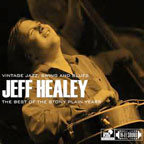 Jeff
Healey
Jeff
Healey
Vintage Jazz, Swing And Blues
Stony Plain CD 1380 www.stonyplainrecored.com
The latest in Stony Plain’s ‘Best Of’ series features
twelve titles from the late blind Canadian jazz and blues-rock vocalist
and trumpet-playing guitarist Jeff Healey, culled from a quartet of jazz/swing
projects he recorded with his Jazz Wizards band for Alberta, Canada’s
esteemed Stony Plain imprint. Label owner Holger Petersen comments—”By
the late 1990’s, Jeff tired of the constant travel and the life
of being a ‘rock star,’ disbanded his globally acclaimed Jeff
Healey Band and opened his own club in Toronto where he could play the
music he loved on Saturday afternoons.” Picks begin with a finger-popping
rendition of the Kalmar/Ruby classic “Three Little Words”
and continue with personalized versions of a couple of Hoagy Carmichael
chestnuts (“Stardust” and “Hong Kong Blues”),
a romping rendition of Eddie Lang and Joe Venuti’s instrumental
workout “The Wild Cat” and a bouncy yet laid-back revival
of Johnny Mercer’s down-home advisory “Pardon My Southern
Accent.” A bonus track, previously only available on a promo-only
CD sampler, “Sweet Georgia Brown,” also features English jazz
legend Chris Barber on trombone. Healey was also a musicologist and serious
record collector who eventually amassed more than 30,000 78’s from
the twenties and thirties—it shows here in spades.—Gary von
Tersch
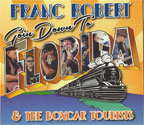 Franc
Robert & The Boxcar Tourists
Franc
Robert & The Boxcar Tourists
Goin Down to Florida
Blue Chihuahua Records 2015
Florida bluesman Franc Robert has already delivered several pleasing albums,
some with his band and last year’s “Ride the Iron Road”
in solo mode.
For this outing he is backed by the trio of Dave Simmons on percussion,
Sam Mudd on bass, and Joe Sadowski on harmonica. The three harmonize well
with Robert’s tenor vocals on this baker’s-dozen-plus-one
of tunes, all written by Robert.
The nearly full hour of music opens with the title cut, an uptempo lament
of a broken relationship simultaneously extolling the potential healing
power of a return to Florida. “A Night with the Blues” features
Robert’s spooky spoken vocal, succeeded by “Voodoo Stomp,”
a mid-tempo Louisiana swamp rocker. “What Is This Love” features
a syncopated Simmons rhythm with a Latin flavor, and “Watch You
Walk Away” lets Robert cut loose with some tangy guitar licks, followed
by his more than capable slide work on the next song, which evokes the
hoary blues metaphor of dark doings at the “crossroads.” Further
exhibiting his range in the blues genre, Robert then serves up “Poor
Me Blues,” a slow back-porch country number.
Next it’s time to dance to the humorous “Cheap Cadillac.”
Reverting to heavy blues mode, “Not a Chance” is my favorite
song of the set, an emotionally plaintive cut with Sadowski’s best
harp work and some fine guitar by the leader. Following another mid-tempo
rocker, Robert provides a smooth clear lead tone on “A Fool for
Trying.” Dance time again! with “Riverboat Stomp,” harp
and slide meshing seamlessly. “You’ll Come Home” combines
soaring upper range guitar single notes with some fancy finger-picking,
and the album closes appropriately with “Goodbye,” a crooned
1950s-type ballad.
From back porch to swamp to the crossroads, this album delivers an unpretentious
and proficient Sunshine State statement.— Steve Daniels
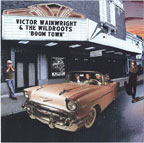 Victor
Wainwright & the Wildroots
Victor
Wainwright & the Wildroots
Boom Town
Blind Pig 2015
Victor Wainwright is one of several young and impressive keyboard players
to emerge in the blues genre in the last few years, and indubitably one
of the best. “Boom Town” is his fourth album, and the third
with his band, the Wildroots. He also collaborated with guitarists J.P.
Soars and Damon Fowler on an excellent Southern Hospitality album in 2013,
and won the coveted Pinetop Perkins Piano Player of the Year Award from
the Blues Foundation in 2013 and 2014.
For this album, the core of six musicians from the 2011 release “Lit
Up!” has been augmented by two more horns, the three saxophones
giving a full and jazzy sound on a baker’s dozen tunes penned by
engineer, producer and bassist Stephen Dees. Wainwright co-wrote two of
the songs, and provides vocals and keyboard expertise on the array of
tasty tunes.
The opening title cut provides evidence that this outing was probably
a pleasure for the musicians: it’s introduced by some solid guitar
riffs, then a throaty Wainwright laugh followed by a guttural growl. The
message: let’s get it on! And the band does, proceeding to dig into
thirteen cuts with verve, anchored by the drum work of Billy Dean and
Dees’ bass. Only three of the numbers track at over four minutes,
but, as someone once said somewhere, brevity is the soul of…what?
wit? or maybe, judging by this CD, soul.
There’s nice variety in the mix. “Saturday Night Sunday Morning”
and “Stop Bossin’ Me Baby” are both 1950s-type rockers,
the former distinguished by a short but pithy piano solo and the latter
by a nice vocal contribution by guitarist Nick Black. “If It Ain’t
Got Soul” does have soul aplenty, with a syncopated rhythm and fine
Wainwright organ. “When the Day is Done” delves into gospel
territory with its slow tempo, multiple vocal harmonies, and the harmonica
of Stephen Kampa.
“Genuine Southern Hospitality” features the adept slide guitar
of guest Ernie Lancaster.
Although enjoying the album thus far, I was wondering when Wainwright
would cut loose on the keys. The answer is “Two Lane Blacktop Revisited”!
An intro drum cascade leads into a furious rock boogie, with Victor really
stretching out. After “Wildroot Farm,” a slow backporch cut
with tinkly piano and plaintive harmonica reminiscent of country-folk
singer Michelle Shocked’s style of 25 years ago, Wainwright puts
the pedal to the floor with “Piana’s Savannah Boogie”;
see if you can sit still for that one! Several other notable songs lead
to the finale, “WildRoot Rumble,” an extended instrumental
where Victor sits back and noodles while giving the spotlight to the band,
especially Kampa on harmonica.
Note should also be made of Wainwright’s vocals, which are consistently
entertaining. His voice is a Southern stew with Leon Russell, Leon Redbone,
Dr. John, and even a little Howlin’ Wolf thrown into the pot: nice
and savory.— Steve Daniels
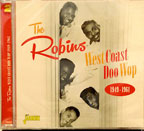
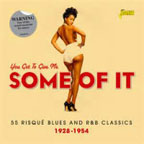 The
Robins
The
Robins
West Coast Doo Wop 1949-1961
Jasmine CD 795
You Got To Give Me Some Of It
55 Risque Blues And R&B Classics 1928-1954
Jasmine CD 3043 www.jasmine-records.co.uk
The spotlight here is on two recent and surprisingly imaginative Jasmine
(UK) double-disc CDs. The core members of the Robins (Ty Terrell Leonard
and the Richard brothers, Billy and Roy) first came together in high school
hallways in Los Angeles in 1945 as the A-Sharp Trio and originally “took
flight” as the Four Bluebirds after bandleader Johnny Otis discovered
them in a talent show at his famed Barrelhouse Club. One of the first
and certainly the most efficacious of the West Coast’s teen-oriented
vocal groups—as opposed to more adult-oriented outfits like the
Mills Brothers and the Ink Spots—their approach originally owed
a debt to the Orioles and after the arrival of Bobby Nunn, the Ravens.
Later, of course, after joining forces with the songwriting team of Leiber
and Stoller, they morphed into the Coasters. This 58 track extravaganza
spans 1949-1961 and compiles their early pair of chart hits (“Double
Crossing Blues, with Little Esther, and “If It’s So Baby”)
along with a boatload of similarly notable numbers, culled from a variety
of mostly independent labels that, across the board, underline their musical
genius - whether on earnestly harmonious ballads like “There’s
Rain In My Eyes” and “Oh Why,” nascent rock ‘n
rollers such as “Let’s Go To The Dance” and “All
Night Baby” or contagious R&B novelties on the order of “Ten
Days In Jail,” “Framed” (add Richard Berry) and “Cherry
Lips.” Also noted is a great 1957 cover of Hank Snow’s meditative
“(Now And Then There’s) A Fool Such As I” that Elvis
quickly picked up on as well as the eerie “Live Wire Suzie”
that sounds like a lost Captain Beefheart number. Egads!
There have been a host of semi-pornographic collections like this two
CD You Got To Give Me Some Of It available over the decades, but this
is the first one I can recollect that has such a wide range of well-chosen,
double entendre-laden numbers—beginning with 1928’s two-part
“Furniture Man Blues,” with Lonnie Johnson and Victoria Spivey
trading verses, to the Toppers’ “Baby Let Me Bang Your Box”
from 1954—and includes such classics of the “party record”
genre as Roy Brown’s two-part “Butcher Pete,” Lucille
Bogan’s 1935 moaner “Shave ‘Em Dry,” the Dominoes
banned-nationwide “Sixty Minute Man” and the Harlem Hamfats
with their timeless invitation to “Let’s Get Drunk And Truck”
alongside a gang of more little-known, but just as bawdy, gems. The Clovers
check in with a wild “Rotten Cocksuckers Ball,” Blind Boy
Fuller looks up and wonders “What’s That Smells Like Fish,”
Napoleon Fletcher has a wide smile because “She Showed It All”
and Barrelhouse Annie insists that “If It Don’t Fit Don’t
Force It”—you get the idea. Other favorites include Julia
Lee’s bodacious “I Didn’t Like It The First Time (The
Spinach Song)”, Wynonie Harris’s complaint “Sittin’
On It All The Time” (and his equally spunky ‘I Like My Baby’s
Pudding” “Lovin’ Machine,” “I Want My Fanny
Brown” and 1952’s inevitable “Keep On Churnin’
(Til The Butter Comes),” the Mississippi Sheiks playing a lively
game of “Bed Spring Poker” and the more-so daring Blenders
with their cautionary “Don’t Fuck Around With Love.”
Not to mention Josh White’s “Sissy Man” and Victoria
Spivey’s explicit tale of a “One Hour Mama.” Indeed! —Gary
von Tersch
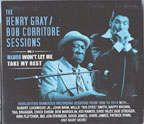 Henry
Gray and Bob Corritore
Henry
Gray and Bob Corritore
The Henry Gray/Bob Corritore Sessions, vol. 1
Blues Won’t Let Me Take My Rest
Delta Groove 2015
At the time of this writing pianist Henry Gray is 90 years old. Let’s
be thankful that he is still around to deploy his blues expertise. We
lost Robert Lockwood Jr. at age 91 in 2006, David “Honeyboy”
Edwards in 2011 at the age of 96, Pinetop Perkins also in 2011 at the
age of 97, and B.B. King in May 2015 at the age of 89. Maybe the blues
keeps these luminaries young! It’s some compensation for the premature
losses of such stellar bluesmen as Magic Sam and Hollywood Fats, both
at 32 years old.
Born in Louisiana, Gray migrated to Chicago in 1946 and became a valued
session man for Chess and other labels, before assuming the piano seat
in legendary Howlin’ Wolf’s band from 1956 to 1968. In the
decades since he has returned to Louisiana, fronted his own band, appeared
on innumerable records, and garnered myriad blues awards. This compilation
by his friend, impresario, and frequent colleague, harmonica maven Bob
Corritore, encompasses selected tunes from the last two decades with an
array of musicians, and a tasty set it is. Every tune features Gray on
keyboard and Corritore on harp, with an impressive list of guests including
Lockwood, John Brim, Bob Margolin, and Kid Ramos.
For those not familiar with the two principals, let me say that you may
be most impressed by Gray’s vocals. Not mainly known as a singer,
he acquits himself well on ten of the fourteen numbers, displaying a raspy
range and considerable emotion. Check out, for example, the title tune
and the B.B. King cut “She Don’t Love Me No More,” both
slow 12-bar blues. The same 12-bar standard blues format is followed throughout
the entire album, with the exception of a cover of Fats Domino’s
“I’m in Love Again,” a 1950s-style R&B piece with
suitable saxophone courtesy of Doug James.
Some other highlights include fine vocals by Tail Dragger, Dave Riley,
and Nappy Brown, two lead guitar forays by Kid Ramos, and a snazzy guitar
interplay between Kirk Fletcher and Chris James on “Boogie Woogie
Ball.” Margolin’s slide guitar on Lowell Fulson’s “Trouble
Blues” is not to be missed.
Corritore’s adept harmonica is a consistent pleasure, as he eschews
long solos in favor of tasteful accompaniment. Similarly, Gray’s
piano virtuosity is generally subordinated to the integrity of each song.
All in all, a solid and high quality retrospective look back at a fruitful
collaboration. — Steve Daniels
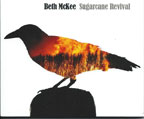 Beth
Mckee
Beth
Mckee
Sugarcane Revival
Swampgirl CD 2015 bethmckee.com
Southern blues-informed roots singer, songwriter (great songwriter) and
dynamic upright pianist and accordion ace Beth McKee’s third solo
album (one was an alert, spirited tribute to Pelican State legend Bobby
Charles) also proves a concept album of sorts as she reflects in words
and music about a recent revisit to her inspirational “Promised
Land” of Mississippi, Louisiana and Texas. “You’ve got
to put cane through the fire to get the good stuff,” McKee says,
recalling harvest time in the sugar cane fields of her native Mississippi.
“That was my intention on this album, to burn off the debris.”
More than ably accompanied by the likes of her percussionist husband Juan
Perez, fiddler Jason Thomas, mandolinist Rhonda Lohmeyer, ukulele whiz
Tom Killiher and a quartet of handclappers among others, McKee’s
upright piano (in true debris-burning fashion) furnishes the foundation
for the signature Sugarcane songs “Long Road Back” (“700
Sundays in the Twilight Zone”) and the fore-mentioned, back-porch
wise “Promised Land”—both of which are steered by McKee’s
powerful vocals that prove equally capable of a gospel-like fervor or
a subtly nuanced sweetness (accent on the nuanced). Further gems, to these
lobes, include the, sadly too-contemporary tent-revival anthem “Trouble
The Waters” along with a pair of Latin-flavored titles, “And
Everything Changed” and “Nobody Knows Like Me.” A career-defining
album imbued throughout with an unmistakable Creole house party vibe and
numerous eyebrow-raising compositions. Not to be missed if she comes your
way!—Gary von Tersch
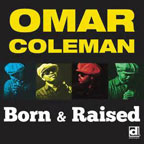 Omar
Coleman
Omar
Coleman
Born & Raised
Delmark CD 840 www.delmark.com
Born in 1973 and raised on Chicago’s West Side, rivetingly soulful
vocalist and top-notch harmonica player Omar Coleman, who cites Junior
Wells and Bobby Rush as his main musical heroes, makes his major label
debut fronting an all-star Windy City blues combo—exemplary guitarist
Pete Galanis, keyboardist Neal O’Hara, bassist Ari Seder and percussionist
Marty Binder with fortifying guest spots by a trio of ax-men (Toronzo
Cannon, Mike Wheeler and Dave Herrero)—on a set of mostly clever
originals. Cannon shines on two uptempo blazers (“Man Like Me”
and “You Got A Hold On Me”) while Wheeler invigorates the
ruminative ballad “I Was A Fool” and adds the proper amount
of funk to “Wishing Well” and Austin, Texas-cured guitarist/songwriter
Herrero rocks out on “Slow Down Baby” and visits Bobby Rush
territory on the nasty “Tell Me What You Want.” Further checker-outers
start with the major-league title tune, the supplicating ballad “One
Request,” a frankly funky “Sit Down Baby” and a nifty
hangover blues titled “Raspberry Wine.” As liners writer David
Whiteis puts it: “Rooted in the blues, spiked with R&B urgency,
and resonant with deep-soul passion, Coleman’s music both moves
the heart and galvanizes the feet.” The future of the blues is in
good hands.—Gary von Tersch
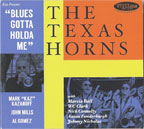 The
Texas Horns
The
Texas Horns
Blues Gotta Holda Me
VizzTone 2015
There are multiple great horn-driven bands in the contemporary blues world;
Big James and the Chicago Playboys and venerable (48 years!) Roomful of
Blues come to mind immediately. I say that we can’t have too many;
they bring a brassy joy and the flavor of 1940s jump blues to the genre.
Multiple Blues Music Award nominee, album producer, and virtuoso tenor
saxophonist Mark Kazanoff has corralled fellow saxman John Mills and trumpeter
Al Gomez into a project called The Texas Horns. Accompanied by drummer
Barry Smith and ace guitarist Derek O’Brien, and a rotating list
of bassists, this combo (actually a functioning live group since 1999)
has produced its first album, and it’s a winner.
The CD opens with a bang: the instrumental (one of several) “Soul
Stroll.” A compelling shuffle, it features brief but pithy solos
by Gomez, O’Brien, Kazanoff, and guest guitarslinger Anson Funderburgh.
(Gratifyingly, the liner notes label the soloists in chronologic sequence.)
Right on its heels comes “Go on Fool,” a bouncy blues/Latino
hybrid featuring the keyboard skills and vocals of The Horns’ fellow
Austin, Texas musician, award-winning blueswoman Marcia Ball.
We know we’re in for variety and high quality, confirmed by the
next cut, “You’re Driving Me Crazy,” a 1940s-style jump
number highlighted by Kazanoff’s adept vocal. This sounds like a
Roomful song, which I mean as kudos.
Rather than detailing specifics of the remaining ten songs, it’s
sufficient to aver that they are all fine. I do have some favorites. “Cold
Blooded Lover” is distinguished by the vocal pipes of another Austin
notable, WC Clark. “Rippin and Trippin” and “Home Cookin”
are finger-popping and toe-tapping instrumentals (if you’re not
already up and dancing). The band’s treatment of the hoary blues
classic, “Caldonia,” is a real barnburner, the horns meshing
fluidly.
Praise also goes to Nick Connolly, who provides rollicking piano on multiple
tunes, and to O’Brien, long-time session man, and band leader at
the famed Antone’s music venue in Austin. Such luminaries as Muddy
Waters, Buddy Guy, and Texas blueswoman Lou Ann Barton have employed his
guitar prowess, and in this set he provides many self-effacing, brief,
but absolutely killer guitar licks.— Steve Daniels
 Deb
Ryder
Deb
Ryder
Let It Rain
Bejem/Delta Groove
Deb Ryder is a new name to me. It’s a name I’ll remember.
The singer was born in the Chicago area and raised in LA, where her step-dad
ran the Topanga Canyon Club. As a teenager, she opened for and befriended
some of the major artists of the sixties and seventies, including Canned
Heat (Bob Hite was an early booster), Charlie Musselwhite, and Taj Mahal.
She and Etta James became best buds.
Fast forward a few decades to this impressive eleven song program of mostly
rockin’, or at least high energy originals. Backed by a stellar
cast of backup players, Ryder is a woman imbued and infused with power
and passion. Having Albert Lee, Kim Wilson, Johnnie Lee Schell, Mike Finnigan,
and others laying down the musical foundation sho’ don’t hurt,
but this is all about that powerhouse voice. She takes it from on fire
(That’s Just How It Is), to late night and sweet (Kiss and Dream)
to acoustic (Round and Around) with an articulate passion.
Two attributes stand out: She is able to blast a ton of vocal power without
screaming. She has that rare ability to showcase the power in her voice
without overwhelming. And, each of the eleven tunes herein are from her
pen. And, it must be noted, she is an exceptionally talented songsmith.
That’s Just How It Is is about her dogged determination to get her
man. When she sings “You can’t shake me/so just take me/nothing
you can do/nothing you can say/cause I made up my mind/it’s inevitable/gonna
be mine all of the time/baby that’s just how it is” you know
you’re dealing with a woman of a single mind. Mike Finnigan’s
work on the B3 is stunning throughout, as is Kirk Fletcher’s guitar.
You Won’t Be True (“you been talking in your sleep/and Betsie
ain’t my name”) is horn driven sass, another strong woman
I-ain’t-takin’-it tune. Cry Another Tear, a handclappin’
organ-driven gospel with on-time backing vocals, is a favorite in a program
of excellent music. Hold Your Lamp High (”So the light of the world
can reach the darkness”) is given dramatic trumpet and guitar lines
from Lee Thornburg and Fletcher.
Ryder is a joy to listen to. Her voice and her writing are flawless. Drummer
Tony Braunagel (Taj Mahal’s Phantom Blues Band, Bonnie Raitt, Eric
Burden) serves as producer. The arrangements are impressive top to bottom.
As noted above, stellar guitar work from Kirk Fletcher is augmented by
Albert Lee (who joins David Fraser on accordion on the New Orleans-flavored
Ma Misere) and the always impressive Johnny Lee Schell who shines on You
Can’t Go Back Again, You Won’t Be True, and Round and Around
(with Kim Wilson’s harp). Wilson also sits in on Guilty as Sin and
Let It Rain giving them an added dimension. Ric Ryder serves as bassist
throughout, except on Kiss and Dream, on which James Hutchinson holds
it down. Saxophonist Lon Price joins Thornburg in a high octane two-man
horn section that shakes up a number of songs. This stands as one of the
standout releases of 2015. —Mark E. Gallo
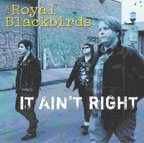 The
Royal Blackbirds
The
Royal Blackbirds
It Ain’t Right
Funky D Records funkydrecords.com
The Blues has long held sway over young musicians and it’s always
interesting when a fledgling band bends the throttle and takes flight
navigating this truly authentic music. In the fifties Blues spawned Rock-a-Billy
and Rock & Roll, in the ‘60s the British brought Blues back
to the USA, the ‘70s amped Blues up to arena levels and over the
past forty years it has circumnavigated the globe. Today that tradition
takes wings with The Royal Blackbirds, a bevy of young suburban prodigies
led by Rebecca Saad’s tastefully searing guitar and Ronnie Spectorish
vocals, joined by Dennis Burck’s lead bass lines and the thundering
drums of Jeanette “Nettie” Gadette. Taken under the wing of
Motor City Hoodoo Guru Tino Gross, groomed in the stables of Funky D Enterprises,
schooled in the hill country blues of R L Burnside and high energy rock
& roll of Detroit, the Blackbirds show a power and wisdom beyond their
years. With “It Ain’t Right” their second release on
Funky D Records they are joined by keyboardist witch doctor Jimmie Bones
from Kid Rock’s band and produced by “Little Tino” himself.
All dozen songs were written by the Blackbirds except a down and dirty
version of James Brown’s “It’s A Man’s Man’s
Man’s World” and the autobiographical “Detroit Zombie”
by Tino Gross.
The title tune “It Ain’t Right” takes off in a blaze
of punk rock frenzy while “All Nite Long” is like the Isley
Brothers single “Shout” played at 33 rpm with the girls’
vocals keeping the intensity of that 45. The bass leads the melodic underscore
of “Dance With Me” with its swooping vocals soaring through
the verses while “Your No Good” features power riffs and dueling
female vocals with Marcie Bolen. The organ and bass seem to drive “It’s
A Man’s Man’s Man’s World” but those boys would
be nowhere without these girls turning this around, gender-wise.“Detroit
Zombie” is a Motor City flavored piece of retro rock referencing
the past while charging into the present as “Queen Of Misery”
blazes tandem guitar and bass under crooning female vocals. “El
Chupacabra” has a suppressed instrumental track like Led Zep through
a tinny car speaker that allows the vocals to overpower the band while
“Blackbirds Boogie” is a full on Zeppelin-like jam. Returning
to the Mississippi hills drone of their first recording with “Hobo
Blues” and “Poor Old Me” notching it up with youthful
enthusiasm.
With their newest CD “It Ain’t Right” this powerful
young trio The Royal Blackbirds are ready to take flight and make it right.—Roger
& Margaret White bluestime@sbcglobal.net
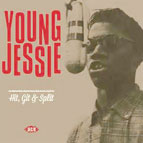
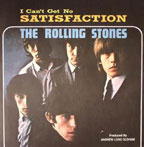
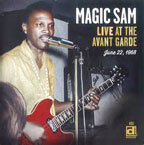 Young
Jessie
Young
Jessie
Hit, Git & Split
Ace LP 027 www.acerecords.com
The Rolling Stones
(I Can’t Get No) Satisfaction
ABKCO LP 9766-1 www.abkco.com
Magic Sam
Live At The Avant Garde
Delmark LP 833 www.delmark.com
Boy, it’s great to see the recent vinyl resurgence and new record
players displayed in mall store windows again. I feel so young! Here’s
a recent trio of releases that hit that “sweet spot” for me.
Young Obediah Donnell Jessie’s Hit, Git & Split a superb collection
of his tenacious rhythm ‘n’ blues recordings for the Modern
label from the mid to late fifties, was originally issued on black vinyl
by Ace back in 1982. This re-mastered version is pressed on 180 gram red
vinyl and features expanded, very informative liners by Ted Carroll on
the inner sleeve. The music, needless to say, is timeless Los Angeles
R&B, hip but not too polished, adequately greasy and straight off
the street—check out terrific titles like the wild, gospel-informed
oeuvre “Rabbit On A Log” (Richard “Louie Louie”
Berry’s adaptation of an old folk song) with its flip—the
all-hell-breaks-loose “Down At Hayden’s,” the rich baritone’s
most well-known song “Mary Lou” (a smash on the West Coast
in 1956) and the enervating title song—long viewed as one of the
all-time classics of black rock ‘n’ roll. Also noted are 1955’s
“Hot Dog”—a Leiber/Stoller song later covered by Elvis—and
a rousing rendition of another Leiber/Stoller shouter, “I Smell
A Rat,” originally Big Mama Thornton’s follow-up to her “Hound
Dog” Top-Tenner. Fun! As is ABKCO’s twelve-inch vinyl single
precipitated by the golden anniversary of the Stones’ June 1965
release of “Satisfaction,” that gave the band their first
# 1 on the U.S. charts and, in the aftermath, hurled Jagger and company
into global stardom. The B-side provides both original “Satisfaction”
US and UK flip sides—an artfully witty “The Under Assistant
West Coast Promotion Man” and the bluesily laid-back tale of “The
Spider And The Fly.” The 180 gram, audiophile vinyl is housed in
a sleeve featuring legendary photographer David Bailey’s shot of
the group, recreating the original seven-inch single’s artwork for
a landmark song that deals assertively with sexual vexation and affirms
an antipathy for consumerist tidings. And, incidentally, helped alter
the course of pop music history. More fun! And even though I reviewed
the CD version of this Magic Sam live-at-a-Milwaukee-coffeehouse project
a couple of issues ago, this double-LP edition deserves coverage as well.
Chicago West Side blues legend Magic Sam died way too soon at 32 and there
is so little music or attendant material available that anything is welcome—and
this release not only contains a pair of extra tracks but some great,
never before seen session photos. Granted, one of the bonus tracks is
only a 38 second start of Freddy King’s hit instrumental “Hide
Away” but the other, a take-off on Little Milton’s “I
Found Me A New Love,” is exemplary. As are all the rest of the numbers—from
scintillating covers of Little Junior Parker’s Sun rocker “Feelin’
Good,” Otis Rush’s “All Your Love (I Miss Loving)”
and Jimmy McCracklin’s “Everynight Everyday” to fiery
Maghett originals such as “Lookin’ Good,” “Bad
Luck Blues” and “You Belong To Me” blues magic is in
the air as the agile and incisive guitarist/vocalist and his truncated
band (Big Mojo Elem on bass guitar and drummer Bob Richey) are in great
shape and the sound is, surprisingly, estimable. Even more fun!—Gary
von Tersch
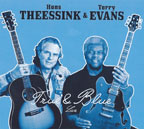 Hans
Theessink & Terry Evans
Hans
Theessink & Terry Evans
True & Blue
Blue Groove 2015
Hans Theessink is a Dutch guitarist and singer who has resided in Austria
for years; he tours worldwide, has made over twenty albums, and has reaped
numerous awards. Terry Evans is a blues and soul singer living in Los
Angeles who has fronted his own band and accompanied many other skilled
performers. This album is their third collaboration, and it is another
stellar winner.
Six of these fourteen tunes were penned by Theessink; the rest are covers.
Every tune is a delight, exhibiting outstanding musicianship, great vocal
harmonies, and considerable variety. It was recorded live at a venue in
Vienna, Austria, and the enthusiastic reception of the crowd was well
warranted. Several of the songs appeared on the duo’s prior joint
efforts, “Visions” and “Delta Time,” but the presence
of a live audience stimulates them to an even higher level of achievement.
Unlike their previous outings, which were accompanied by such luminaries
as Ry Cooder and Richard Thompson, this album features just Theessink,
Evans, their guitars and voices. Theessink has a deep, smooth, and nuanced
baritone, augmented by Evans’ slightly raspy stylings which include
moans, falsetto, and a few yelps. Together they sound sublime, and their
banter and mutual compliments reveal that they, as well as the audience,
are having a grand time.
My personal favorite songs are several of the covers. The Peter Chatman
(Memphis Slim) tune, “Mother Earth,” is given a slow treatment,
with fine vocal harmonizing and Hans’ acoustic guitar expertise.
“Cross Road Blues” is worthy of the Robert Johnson original,
an upbeat version distinguished by more fantastic guitar work and Evans’
growling vocal. “Talk to Your Daughter” written by J.B. Lenoir,
has been covered by many, most notably by Magic Sam in his classic album,
“West Side Soul,” but this rendition with dialogue between
the two singers is different and terrific. “Maybellene” sends
the crowd into ecstasy as the duo digs joyfully into the Chuck Berry rocker,
with an amazing journey up and down the fretwork of his acoustic axe by
Theessink. “Shelter from the Storm” (not the Bob Dylan song
with the same title) is a slow and deeply moving number with a gospel
flavor.
I don’t feel equivocal about this album: it’s superb. Each
man sings beautifully, they harmonize ideally, Evans plays fine guitar
and Theessink’s string artistry is jaw-dropping…this is definitely
on my list for Best Live Album and Best Acoustic Album of 2015.—
Steve Daniels
Book
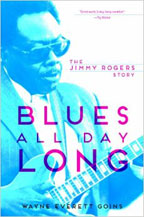 Blues
All Day Long: The Jimmy Rogers Story
Blues
All Day Long: The Jimmy Rogers Story
by Wayne Everett Goins
University of Illinois Press 2014
We all have to survive our childhood and adolescent years (and, for many
of us, some years of adult life) to realize the wisdom of the saying
that “more is not always better.” For myself, I was
primed for that epiphany in the musical realm as over the years I gradually
tired of the spate of rapid-fire notes emanating from the axes of many
famed lead guitarists of blues bands. Technical proficiency is not
synonymous with artistry; speed and volume don’t equate with taste
and sensitivity (although they are not mutually exclusive). Crucially
also, tasteful and creative support makes the lead sound better.
The epiphany was confirmed years ago on a blues cruise, when two of my
favorite guitarists, Tab Benoit and Jimmy Thackery, played with their
combined bands as Whiskey Store. While each dazzled with his leads,
the other’s support as “second guitar” was less flashy
but almost as impressive. Don’t just take that “rhythm”
guitarist for granted; listen to her or him! It’s not easy to do
it well!
Enter stage left: Jimmy Rogers. His name is unknown to even many
blues aficionados, but Rogers was an adept stringman who was close friend
and second, or rhythm” guitarist with the premier version of the
Muddy Waters Band for many years in the late 1940s and 1950s. Subsequent
to his separation from Muddy, Rogers proceeded to enjoy a distinguished
career as leader of his own bands, featuring various configurations and
many fine musicians, performing up until his death in 1997. He also
appeared on innumerable albums and at myriad blues festivals, mentored
younger bluesmen (including his son, contemporary bluesman Jimmy D. Lane),
and earned a well-deserved place in the Blues Hall of Fame.
Goins, an academic and jazz guitarist, has done extensive research to
produce a chronologically full biography of the man as musician.
The narrative commences with Rogers’s birth (as James A. Lane) in
rural Mississippi in 1924, and follows him through his itinerant upbringing
in the care of his grandmother and his early and insatiable love of music.
One of his best childhood friends was future blues harmonica legend Snooky
Pryor. Even before moving to Chicago in 1945, Rogers had either
seen, heard, or often played with and learned from an astonishing panoply
of blues royalty: Honeyboy Edwards, Memphis Minnie, Sunnyland Slim, Robert
Junior Lockwood, Tampa Red, Son House, “Hound Dog” Taylor,
Houston Stackhouse, John Lee Williamson (Sonny Boy Williamson I), and
Rice Miller (Sonny Boy II)…among others! Of course, even those
kinds of idols and mentors don’t guarantee prowess, but Rogers was
apparently a quick learner and avid student of the blues.
Although he began his musical journey playing a primitive diddley bow,
Rogers actually initially became a fine harmonica player before devoting
his attention to the guitar. (Some colleagues attest that he would
have reigned supreme on the harmonica had he concentrated on it.)
Once in Chicago, he gravitated to the Maxwell Street blues scene, worked
his way into gigs as a sideman, and even wangled a few recording dates,
all abetted by benefactor Sunnyland Slim (who aided many other aspiring
bluesmen). Then it all changed in 1948, when Rogers and Waters were
introduced. They meshed immediately and fruitfully, and their association
reached full flower with the addition of harmonica ace Little Walter Jacobs.
Goins limns the group’s fraught dealings with Chess Records and
its honcho, Leonard Chess. He describes their blazing path to the
acme of the blues world, their competition with Howlin’ Wolf, and
the dark decades of the 1960s and 1970s for blues, when rock-and-roll
relegated the genre to an ever smaller niche market. He describes
Rogers’ frustrated retreat from music for an entire decade while
he worked as a small businessman to support his family, and his re-emergence
as a revered figure in blues for the last two decades of his life.
His death in 1997 evoked accolades from innumerable rock and blues musicians;
his influence was extensive and pervasive.
What made Rogers so unique and influential? The Foreword by contemporary
harmonica wizard Kim Wilson is a humorous and reverential testimony to
Rogers’ personal appeal, and Bob Margolin, one of Rogers’
successors as guitarist in the Muddy Waters Band, summarizes well his
musical legacy: “It was not simply playing rhythm guitar while another
instrument was featured. Jimmy’s parts wove in and out of
the others, informed by knowledge of the style and players and some creative
extrasensory perception.”
Goins deserves praise for the depth and breadth of his research. Now
that I know a lot more about Jimmy Rogers, I’m going to pay him
and author Goins the best tribute: listening to his music, with Muddy
and without.— Steve Daniels
Home
/ Blues Blogs /
Artist Links / Blues
Links / Videos / Store
Subscribe / Advertise
/ Back Issues
/ Contact / Staff